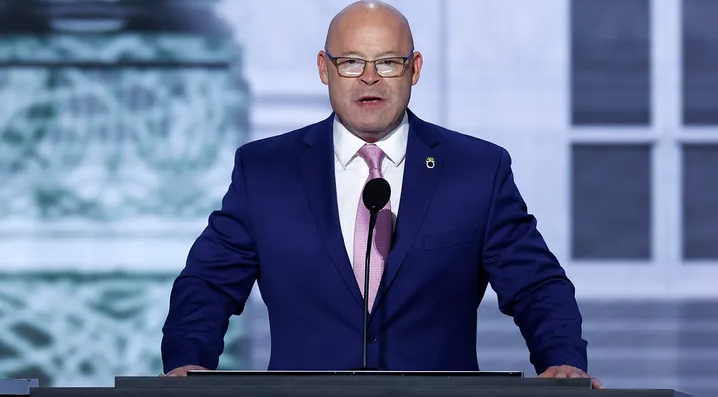This Wednesday, the International Brotherhood of Teamsters made the surprising decision not to extend their endorsement to either Kamala Harris or Donald Trump in the presidential race. This move was seen as particularly remarkable, given that the union has a strong following of 1.3 million members. This lack of endorsement, however, was not entirely unexpected according to Art Wheaton, an expert in labor studies at Cornell University.
The absence of an endorsement from the Teamsters suggested a possible shift within this massive union membership. Marick Masters, a retired business professor from Wayne State University in Detroit, who has a keen interest and knowledge in labor issues, proposed this idea. He interpreted the union’s silence as indicative of a broader realignment in the union’s base.
The Teamsters openly voiced their concerns about the presidential nominees. A point of great concern highlighted was a contract legislated by Congress in 2022 that impacted their members operating in the railroad division. The union’s reluctance to back either candidate seemed to hinge on issues of direct relevance to them.
The Teamsters are not alone in their hesitancy. Indecision about endorsing a presidential candidate has been detected among other arenas of the labor industry as well. The perception of imperfect choices has led to delay or non-commitment on endorsements by several significant unions.
In contrast, the United Electrical, Radio & Machine Workers of America union bravely took a position last Friday. They distinctly endorsed Harris but it came with a certain degree of reservation. They particularly expressed unease about what they see as a manipulated transition of power from Biden to Harris, deeming it ‘thoroughly undemocratic’.
But the Teamsters’ non-endorsement has led to another line of interpretation. There seems to be an apparent indifference to the Biden-Harris administration’s actions, even positive ones that would seemingly benefit their members. An example of this is a law, passed under their administration, aimed at preserving the pensions of numerous union pensioners.
While the lack of endorsement did not categorically state any preference for either candidate, the implication resounded loudly. Here is a significant labor union, with a membership base of millions that harbors extensive influence, shrugging off the traditional tendency to endorse a candidate. It implied a waning trust or lack of sufficient support among their members for either candidate.
Art Wheaton, a noted expert on labor studies, was not startled by this development. He imparted his insights, signaling this level of behavior as not outside the norm. Union actions can often be read as a reflection of overall sentiment within the group. In this case, it meditated formal ambivalence to the candidates presented.
Delving deeper, Marick Masters, a connoisseur in business and labor matters, observed an intriguing sign. He saw the Teamsters’ lack of endorsement as a much larger relocation inherent within the union. The Teamsters’ silence, according to him, speaks volumes about a broad realignment within the union’s demographic.
A substantial bone of contention with the potential presidential nominees is Congress’s 2022 decision on a contract affecting their railroad sector colleagues. This instance was pointed out by the Teamsters as a simplification of their resistance to endorsing. In essence, it demonstrates a focus on issues that pose direct implications to the daily realities of their members.
The climate of endorsement hesitation is not unique to the Teamsters. A critical examination of the labor industry surfaces the existence of this trend among many others. The shortage of endorsement from key unions stems from a shared sentiment regarding the candidates at hand.
In stark contrast to this sentiment, the United Electrical, Radio & Machine Workers of America took a different approach. Their eventual endorsement of Harris was not without its criticisms. The union leadership expressed blunt dissatisfaction with what they classified as an ‘undemocratic’ transition of power.
Interestingly, the Teamsters’ decision not to endorse also revealed an indifferent undercurrent towards the Biden-Harris administration’s efforts. This was despite the administration’s implementation of a law aimed at preserving the pensions of countless union retirees. Thus, even potential benefits seemed not to sway the union’s judgment about the administration.
In summation, the International Brotherhood of Teamsters’ decision to abstain from endorsing either candidate underlines a palpable shift in union politics. It speaks to a possible collective sentiment within the union that is hesitant or reticent about the choices at hand. At the very least, it signifies a dramatic departure from the norm of unhesitant endorsement typical in a race of such importance.
TEAMSTERS RELEASE PRESIDENTIAL ENDORSEMENT POLLING DATA
“For the past year, the Teamsters Union has pledged to conduct the most inclusive, democratic, and transparent Presidential endorsement process in the history of our 121-year-old organization—and today we are delivering on… pic.twitter.com/CnFNN9uosx
— Teamsters (@Teamsters) September 18, 2024
?President Trump reacts to Teamsters not endorsing either candidate for the 2024 Presidential Election:
“It’s a great honor. They’re not going to endorse the Democrats. That’s a big thing!” pic.twitter.com/9Ub9vQT3yI
— Benny Johnson (@bennyjohnson) September 18, 2024


